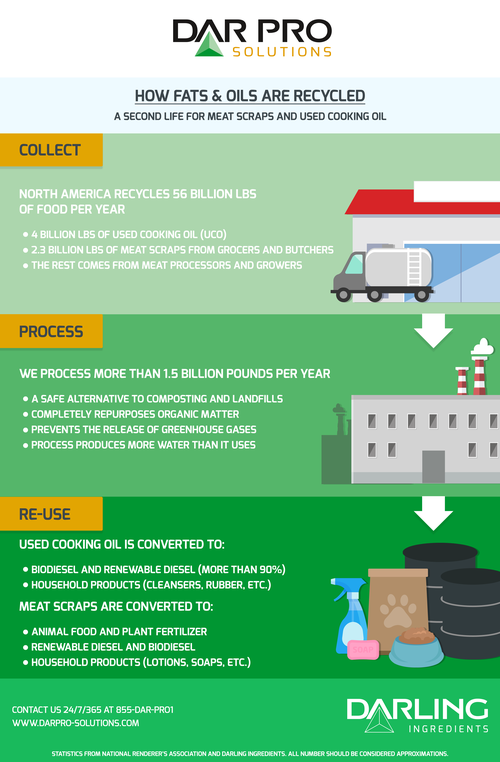How Used Cooking Oils & Meat Fats Are Recycled
The leftover pot roast from Sunday evening, the greens that wilted before they were used, the super-sized restaurant serving that can't be consumed in one sitting—that type of food waste can be addressed by meal planning, purchasing accurate quantities, using proper freezing methods, or preparing smaller portions.
However, the fat and bone your butcher trims from choice beef or the used fryer oil at your favorite fast food chain present unique challenges.
Carbon-based organic materials, if left to decompose naturally, can release harmful greenhouse gasses and attract rodents and pathogens. These materials must be disposed of or recycled in a safe, timely fashion. That’s where we come in!
DAR PRO Solutions collects meat scraps and used cooking oil that restaurants, supermarkets, butchers, and processing plants can’t use. We transform this material into sustainable ingredients that are used to create biofuels, animal food, and even household items like soap, solvents, plastics, and more.
Here’s how we do it, also illustrated in our infographic below:

Step 1. Collect
According to the North American Renderers Association, approximately 56 billion pounds of inedible meat by-products and used cooking oil is recycled in North America each year. Of this total, 2.3 billion pounds of fat, meat, and bone come from retail butchers and supermarkets. 4 billion pounds of used cooking oil are collected from restaurants and foodservice establishments, and the remaining 49.7 billion pounds are from growers and meat processing plants.
If all of this material were put into a landfill, the country would be out of free space in less than 4 years. Instead, service providers like DAR PRO Solutions collect these ‘unusable’ materials and transform them into valuable ingredients. This process is known as rendering.
Step 2. Process
The primary purpose of the rendering process is to create sustainable ingredients that can be used in a variety of products. By cooking down meat scraps, bone, fat, and cooking oil, we can produce proteins, meals, fats, and oils that can be used to make everything from biofuel to hand sanitizer. Aside from upcycling valuable organic material, the rendering process also has some positive effects on the environment.
If buried, landfilled or composted, organic matter can release harmful greenhouse gasses and encourage the growth of toxic pathogens. The rendering process virtually eliminates these dangers by repurposing the carbon and other bio-matter.
As a matter of fact, rendering is so effective that the EPA estimates that each year, rendering plants in North America reduce the same amount of carbon emissions that approximately 12 million cars produce.
In addition, our rendering plants are net water producers. After dehydrating the raw materials and removing contaminants, the excess water can be transferred to local water treatment facilities for further filtration. Our operations produce more water than they use.
Step 3. Reuse
We reuse most all of the material we collect from our customers. Used cooking oil dedicated to repurposing for the creation of clean burning biofuel and the meat scraps and more
- Our parent company, Darling Ingredients, processes 15% of the world's slaughtered animals and 50% of the used cooking oil in the U.S. Through our joint venture with Diamond Green Diesel (DGD), we take the animal fats and used cooking oils and turn them into an ingredient crucial to the creation of renewable diesel. DGD has the capacity to produce billions of gallons of renewable diesel annually.
Biofuel can be broken down into two categories: biodiesel and renewable diesel. Both of these biofuels are made from the above feedstock, but with different processes. The production of biofuel also creates several useful co-products.
Biodiesel production generates glycerin for soap, lotion, and shampoo. The renewable diesel process creates renewable butane and propane, and naphtha, a solvent used in paint thinner, varnish, and plastic. Additionally, when compared with petroleum diesel, biofuels reduce carbon emissions by up to 80%.
The inedible meat, fat and bone not used for biofuel is processed into sustainable ingredients such as protein meals, bone meal, blood meal, minerals, oils and fatty acids that are used to produce animal feed, pet food, our own NatureSafe organic fertilizer, and numerous other household and commercial products.
Darling Ingredients’ edible divisions (Rousselot, Peptan, and Sonac, located primarily in Europe, Asia and South America) operate in independent, state-of-the-art, food-grade facilities dedicated to producing gelatin, collagen peptides, hemoglobin, and bone ash. These ingredients have a wide variety of uses in the food, pharmaceutical, and health industries worldwide.
Learn More
If you’ve been thinking about using sustainable solutions for your store’s needs, consider giving us a call. DAR PRO Solutions will collect your used cooking oil or meat scraps and put them to a new use. Rendering has tremendous benefits for the environment and providing for the needs of a growing population, but we can’t do our job alone.
DAR PRO Solutions is a thought leader in the industry for used cooking oil collection, grease trap services, and animal by-product collection. Our innovative equipment solutions, strong customer support, and service expertise will make handling grease a worry free part of your business. Reach out to a DAR PRO representative today and find out how your ghost kitchen or restaurant can benefit from our partnership. Call us 24/7/365 at 855-DAR-PRO1 (855) 327-7761.
Contact Sales
For customer service inquiries call our toll free number (855) 327-7761
By submitting this form I agree to the privacy policy including the usage of contact details to contact me for marketing purposes.
04/19/2018
